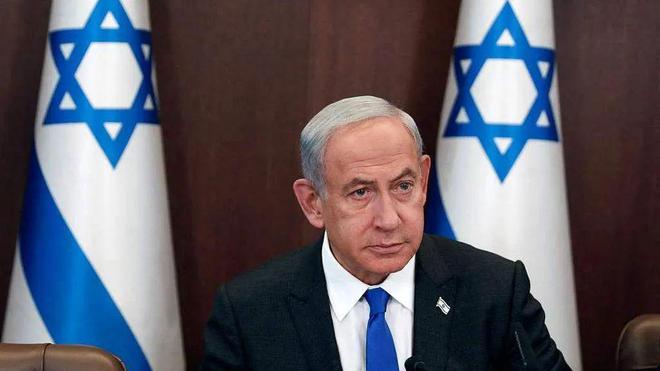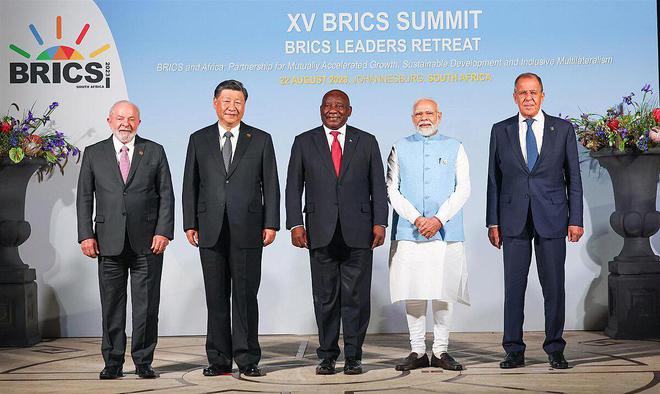
9月9日,2023年G20峰会在印度召开,非盟成为二十国集团永久成员。此前的8月24日,金砖国家领导人第十五次会晤召开特别记者会,宣布金砖国家扩员,阿根廷、埃及、埃塞俄比亚、伊朗、沙特阿拉伯、阿联酋获邀加入金砖国家合作机制,六国将于2024年1月1日正式加入。
下个月,第三届一带一路峰会将在北京召开。可以看到,全球南方国家的议程和发展中国家的利益成为全球关注的焦点。
近日,南非亚洲及金砖事务特使、外交部副总司长阿尼尔·苏克拉尔(Anil Sooklal)接受观察者网专访,解读扩员的意义、分享未来将如何持续扩员、推动本币化以及确保金砖不是“有名无实”的组织等各界关注的问题。
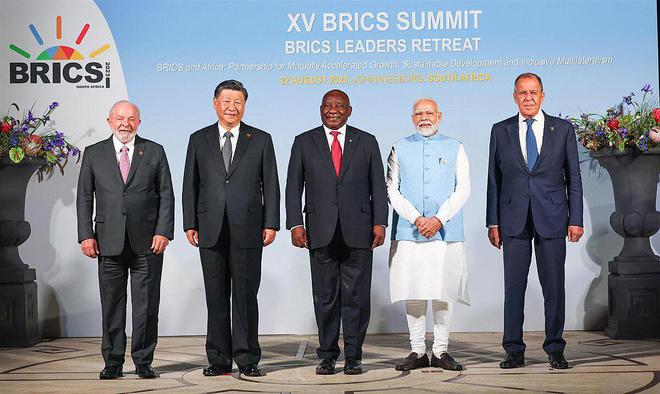
2023金砖领导人峰会合照
【采访、翻译/观察者网 李泽西】
以下为采访实录:
观察者网:金砖国家峰会最受关注的成果之一是其扩员,有六个新成员将于2024年1月1日正式加入。您认为这些新成员给金砖带来了什么?
苏克拉尔:大家还记得,去年在中国主持召开的虚拟峰会上,与会领导人就决定研究扩员问题,从那个时候开始我们就已经在为这件事情做准备了。
考虑扩员前,我们必须首先确定各国领导人赋予金砖事务特使的职权,他们要求我们制定扩员的指导原则、标准和程序。这份文件通过协商得到一致支持,并提交给各国外长,然后外长们可以研究具体接纳哪些国家的问题。有22个国家正式提出希望成为金砖成员,8月20日晚,在约翰内斯堡举行的金砖国家务虚会上,与会领导人对此进行了长达数小时的深入讨论。
值得注意的是,这六个国家地域分布很广。随着阿根廷的加入,我们有了两个拉丁美洲的地区领导者。有两个非洲国家,其中埃及虽然是一个阿拉伯国家,但非洲认为,作为非洲联盟的成员,它首先是一个非洲国家。当然还有埃塞俄比亚,它是一个重要的国家,因为它是唯一一个没有被殖民的非洲国家,也是非洲联盟的所在地,本身是一个文明古国。
有三个西亚国家申请加入,即沙特阿拉伯、阿联酋和伊朗。沙特阿拉伯、伊朗是该地区非常重要的国家,沙特阿拉伯约有3800万人口,伊朗有8000多万人口。阿联酋也许是一个小国,但却是西亚一个非常重要的国家,从70年代的一个普通渔村发展成为今天最具活力的国家之一,在海湾国家中国内生产总值位居第二,仅次于沙特阿拉伯,也是该地区最国际化的国家之一。
我认为这是一个很好的平衡,因为我们已经有来自南亚的印度,来自东北亚的中国。新成员的加入,让我们未来的地域分布也很均衡,包括世界上几乎所有与发展中世界有关的地区。因此,我认为这是金砖国家大家庭在地域平衡方面的一个重要补充。在集体分量上,我们将由此前全球人口的42%升至46%,名义GDP将占全球的29%。
这些国家中的每一个都为丰富金砖五国带来了额外的价值,不仅是贸易、国内生产总值、技术,还有人民、文化多样性、文明以及他们为金砖五国大家庭带来的丰富性。此外,三个西亚国家在化石燃料方面都非常丰富,特别是石油和天然气。加上埃及、俄罗斯和巴西,金砖国家将占全球化石燃料储量的40%以上,这也是非常重要的。
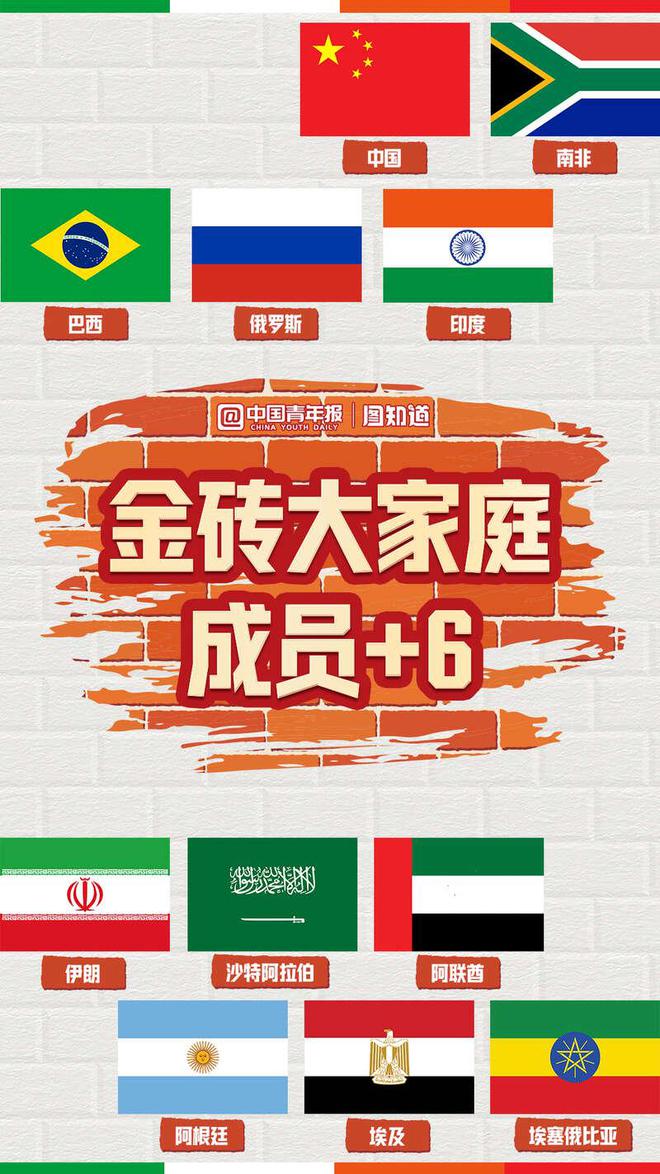
金砖扩员至11国(图源:中国青年报)
观察者网:这次扩员包含了四个中东国家,您认为这仅仅是地区多元化和经济实力增强的体现,还是另有原因?过去几个月,多方提到美国在该地区影响力下降,尤其是在中国促成沙特和伊朗和解之后,这一地区的战略价值越来越凸显。
苏克拉尔:我认为,西亚一直是世界上一个非常重要的战略地区,因为其蕴藏着丰富的石油和天然气,这就是为什么尤其是西方国家对这一地区给予了高度关注。但这些国家也希望实现多样化,并与全球南方建立更牢固的关系。我认为,今年早些时候中国促成了沙特阿拉伯和伊朗之间的和解,是该地区的一个重大进展,也会对该地区国家关系正常化产生连锁反应。
我认为这是一个非常积极的发展,不仅对这两个国家,对整个地区都是如此。在这个充满重大挑战的地区实现和平,对于全球地缘政治和地缘安全形势而言,也是一件好事。我们一直认为,伊朗和沙特阿拉伯是该地区和平的关键,如果他们互不沟通、关系紧张,整个地区就会受到影响。
随着两国关系的缓和,各国现在开始互派高级代表团,开设大使馆,关系正常化,给该地区和平与发展带来更大的机会。现在两国成为金砖大家庭的成员,将为两国提供更多的机会、更多的平台来定期互动。金砖邀请西亚三国是认识到这一地区的战略意义,而这三个国家都申请成为金砖国家成员,也是因为看到了与金砖国家合作的价值,看到了自己的未来与金砖国家的未来发展息息相关,他们可以为金砖国家的未来发展做出重大贡献。

在中国的推动下,沙特与伊朗重新建交(图源:新华社)
观察者网:您认为未来几年金砖国家将如何继续引入新成员国?一些媒体报道称,印度或巴西希望在接纳新成员方面制定更严格的标准,而中国和俄罗斯则更明确地支持接纳新成员。您对此有何了解?
苏克拉尔:我从一开始就全面参与了这一进程,并担任金砖事务特使小组主席。印度和巴西反对扩建的说法并不属实,我认为这是误报道,所有金砖国家都同意扩建。
在一开始确实存在准入标准上的意见分歧,经历了激烈的协商过程。众所周知,扩员进程始于去年中国担任主席国期间。当时就此举行了两次会议,可惜进展甚微。但今年南非接任主席国后,我们至少举行了六次金砖事务特使之间的会议。所有国家都致力于扩员,因为五国领导人去年都同意启动扩员进程。
在任何像金砖国家这样的多边组织中,所有国家都希望确保自己的立场得到反映。最终,通过一致协商,我们确认了有关准入标准的文件。这使得扩员成为可能,各国外长就可以研究我们制定的标准,并运用这些标准向各国领导人提出具体扩员建议。所有领导人就扩员六国达成共识,这次是金砖非常实质性的扩大。
众所周知,金砖国家上一次扩员是在2011年三亚峰会上,在中国的主持下,南非被接纳为正式成员。在此后的12年间,我们没有进一步扩员。2018年南非担任主席国时确实考虑扩员,将此作为一个议程项目,但当时各国领导人认为,在扩员之前,我们需要进一步巩固五国之间的合作。
2022年,在中国的主持下,扩员再次被提上议程,我们作为一个集体开展了工作,并就此取得了巨大成功。
扩员是一个持续的过程。纵观任何多边组织,欧盟从1957年的6个成员起步,今天有27个成员国,经历了不同阶段的扩张。东盟也是如此,1967年开始时只有5个成员,今天有10个成员国,有可能增加到11个。上合组织最初也是5个成员,现在有9个成员国。扩员在任何进步和包容的组织中都是正常的,未来大家将继续看到更多国家申请加入金砖。
这次申请的22个国家中,我们只接纳了6个国家。正如南非拉马福萨总统在峰会上宣布的那样,这是扩员的第一阶段,并没有说扩员已经结束。约翰内斯堡宣言第92条提出,各国领导人已责成外长们研究拓展伙伴国家合作模式的问题,并将在明年俄罗斯峰会时做报告。全球南方国家对加入金砖大家庭有着浓厚的兴趣,未来将会有更多国家成为金砖组织的正式成员,各国领导人必须为此付出努力。
观察者网:简要地说,就接纳标准达成的共识是什么?在16个未被接纳的国家中,你们优先考虑哪个国家?
苏克拉尔:准入标准、准则和指导方针的文件是内部机密的,现在将首先与6个新加入的成员国分享。如你所知,峰会上已经口头发出了正式邀请,但拉马福萨总统正在致函六国元首,正式邀请他们成为正式成员,并附上他们必须遵守的文件标准。
我可以非常笼统地说,选择这六个成员国时,我们非常谨慎,确保他们也赞同金砖五国所代表的愿景和原则:创造一个更加公平的世界,支持全球治理架构、政治安全、金融、经济等方面改革,致力于维护多边主义、反对单边主义,并致力于维护国际法。这些都是金砖国家自成立以来所秉承的一些重要原则,新成员也要符合这一指导金砖国家合作的精神。
我不认为他们在支持金砖国家的价值观和原则方面会有困难,他们也是这些价值观和原则的积极倡导者。
他们还必须在各自地区具有良好的声誉,发挥重要作用,在国际上也通过全球多边体系发挥重要作用。我们还努力考虑地域代表性,确保金砖五国代表全球南方各地域。当然,另一个非常重要的标准是,你必须是全球南方国家,因为金砖国家是关于发展中国家的。以上就是有关指导原则和标准的文件中所包含的一些重要原则。
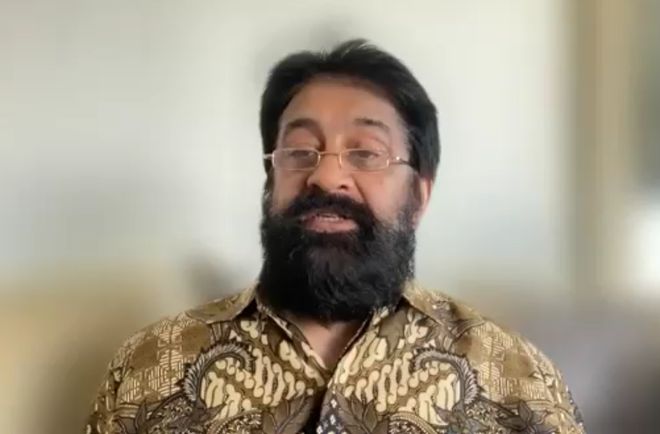
苏克拉尔采访照
从现在到明年夏天,不会再有任何扩员。我们将等待部长磋商的结果,为伙伴国家制定合作模式。但与此同时,我们建议也应该有另一种模式,考虑那些非常希望与金砖国家建立联系,但可能不想成为正式成员的伙伴国家,已经有国家提出这样的意愿了。这是金砖各国部长们明年的一大工作,将在明年的俄罗斯峰会上向领导人提出建议。
观察者网:新成员的加入会对“金砖”的英语缩写产生什么影响(BRICS的B代表巴西Brazil、R代表俄罗斯Russia、I代表印度India、C代表中国China、S代表南非South Africa)?
苏克拉尔:我认为这个缩写不会被改变,因为“金砖”在某种意义上已经成为一个全球品牌。金砖现在象征着其倡导的价值观和原则,这些不是金砖五国所独有的。事实上,在“金砖+”和非洲会议上,有61个国家出席了会议,他们都认同金砖国家的主张。
因此,今天的金砖国家不仅仅是五个国家。当你使用“金砖”这个词时,它并不是专门指这五个国家的。金砖国家的发展已经超越了自己,发展成为一个品牌,代表了全球南方国家的愿景,以及我们希望看到的全球架构改革,使之更加多极化、多文明和多文化,从而更好代表全球社会的本质。
全球社会不是同质的,是高度多元的,这也是金砖国家的性质。金砖经常遭到非议,说我们的治理体系、政治制度、人民和文化等方面存在巨大差异。但这正是金砖的丰富性所在,也是我们运转良好的原因。我们不想把每个国家都套上统一的行为准则或试图说教他们如何处理国内事务。我们尊重主权、尊重各国的治理体系和政治制度,珍视各国丰富的传统、人民、文化、文明、美食、服饰和语言。这才是世界的本质,世界之所以丰富多彩,是因为我们拥有如此丰富的多样性。
全球社会不是同质化的,那么金砖国家为什么要因为没有统一的治理体系而受到批评呢?金砖国家的力量在于我们每个国家带来的多样性、独特丰富的传统和治理体系。
观察者网:确实有担心认为金砖内部差异可能会带来问题,特别是内部运作方面的问题。一些金砖国家存在一定的利益分歧,比如印度和中国,伊朗和沙特阿拉伯;同时,其他国家的政治变化,比如巴西前总统博索纳罗的上台,阿根廷也可能将选出一个主张“全面美元化”的极右翼总统,从而影响其参与金砖的程度。您对这些担忧有何看法,金砖国家如何应对这些潜在问题?
苏克拉尔:金砖国家不是一个让各国来解决分歧的平台。它是提供让各国来讨论分歧的平台,看看能否找到解决分歧的方法和途径。
金砖国家是一个基于共识的组织。是的,国与国之间存在差异乃至紧张关系,这很正常,不是金砖五国大家庭独有的现象,许多多边或地区组织中都有这种情况。例如,欧盟在俄罗斯乌克兰冲突问题上就存在分歧,东盟在缅甸问题上也面临同样的挑战。
但多边组织提供了一个平台,让国家可以相互交流。我认为这一点很重要,各国可能会有分歧,但他们仍然能够从大局角度进行对话,暂时抛开分歧。作为一个集体,作为地区和全球性大国,如何能够为建立一个更加公平的全球秩序而共同努力,并专注于对全球社会有益的事情,这就是金砖国家的意义所在。
这些紧张局势都将通过双边方式解决,并不妨碍他们在其他重大全球性问题上开展合作,比如全球多边体系改革、应对气候变化、应对疫情、粮食安全和能源安全等影响所有人的关键挑战,这些需要我们集思广益,共同努力,以积极的方式应对。
观察者网: 您提到了欧盟,它可能代表了不同国家合作程度的上限。您也提到了欧盟面临的问题,尤其就俄乌冲突的意见分歧导致他们未能实施多项制裁计划,在国际上造成了一定声誉损失。那金砖的作用是否也是有限的,虽然它确实能促进对话,但在其他领域可能较难取得实质性成果?
苏克拉尔:金砖内部有20个部长级沟通轨道,这个数字还在增加。在南非完成本次轮值主席国前,我们将主办近200次会议。当然,衡量我们合作成功与否的标准不是主办会议的次数,而是实质性成果。
主要沟通轨道都有实质性成果,在科学、技术和创新方面,我们的科学家、学者和学生目前正在开展200多个联合研究项目。这是为金砖国家的利益而开展的实质性合作,金砖国家的成功必须以其为我们人民的生活带来的实际福祉来衡量。它必须能够解决贫困、欠发达、粮食安全和债务减免等问题,这些都是金砖领导人谈到过的问题。
还有一个议题是本币化,宣言的第45条写道,领导人责成财政部门或央行行长研究本币支付工具和平台的问题,并将在下一次峰会上做报告。我们正在研究在全球舞台上开展业务、贸易和金融互动的多样化方式,而不是依赖一种或两种货币,这不利于我们。

金砖五国货币
在这些重大问题上,金砖五国起到了催化的作用。中国创建了自己的支付平台,印度和俄罗斯也做到了,全球南方国家都对单边制裁和资金冻结感到非常焦虑,俄罗斯和伊朗就无法使用自己的资金。我们正在寻求变得更加独立,而不是被一两个实施单边制裁的国家所挟持。这些制裁不被任何一个金砖国家所承认,也不被联合国所承认。目前联合国安理会是唯一负责国际制裁的机构,因此,金砖国家能够做一些实事。
这已超越了金砖本身,包括非洲在内的许多国家都在考虑深化本币贸易和借贷。众所周知,新开发银行已经决定在2026年将本币贷款从目前的20%提高到30%。他们在成员国中发行了第二笔本币债券,此前已在人民币市场上发行了几笔债券。8月,他们又在南非兰特市场上发行了债券,获得了超额认购,原设定的10亿兰特(约合3.8亿元人民币)上限被提高到了15亿兰特(约合5.7亿元人民币)。
市场可以看到,鉴于新开发银行的优良记录,这些债券前景很好。这对南非来说是个好消息,因为我们可以开始以兰特为单位借贷,在美元波动和兑换成本等方面节省大量资金。非洲联盟已经做出决定,为促进自由贸易协定,各国应深化本币贸易,这也是非洲银行推出泛非支付结算系统的原因。约有10家中央银行和20多家商业银行已经认购了这一工具,预计每年将为非洲节省超过50亿美元(约合370亿元人民币)的贸易成本。
这只是金砖发挥作用的一个例子。在深化当地货币贸易和不依赖美元方面,还包括我们的支付系统,我们不将彻底依赖于环球银行间金融电信协会(SWIFT)系统。正如我所说的,所有主要的金砖国家现在都在创建自己的支付平台。
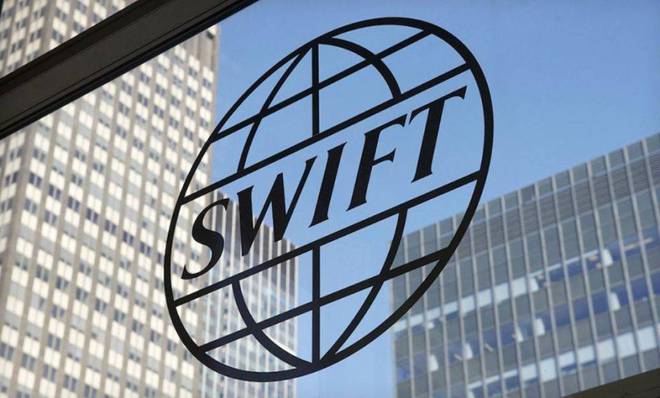
环球银行间金融电信协会(SWIFT)系统
观察者网:您8月接受彭博社采访时曾说“有一种很不幸的说法是,金砖国家集团是反西方的,金砖国家集团的成立是为了与七国集团(G7)或‘全球北方’竞争,这是不正确的”。你认为所有金砖国家成员都赞同你的观点吗?例如,伊朗表示,加入金砖国家意味着越来越反对美国的单边主义,俄罗斯也曾提到金砖国家是推动反美议程的平台。
苏克拉尔:五国一致认为,金砖国家不是一个反西方的组织。金砖首先关注自己,其次关注全球南方,再然后参与集体应对全球挑战,并与所有寻求与我们合作、认同我们价值观、赞同我们在应对全球挑战方面愿景的国家合作。这就是为什么联合国秘书长古特雷斯也在金砖国家首脑会议上给予支持。他指出,全球北方国家必须加大努力应对全球南方的不满,占全球人口85%以上的全球南方仍然被边缘化,在全球重大决策中仍然是异类。
金砖五国都是G20成员,新加入的六个国家又有两个G20成员。因此,G20有7个金砖成员国,与G7集团数量相当,G7集团和金砖共占G20集团中19个国家中的14个,欧盟是第20个成员。凭什么只有欧盟成为G20集团的正式成员?非洲联盟的规模更大,有55个国家,14亿人口,而欧盟只有27个国家,不到6亿人口,但因为它代表发达的西方国家,所以欧盟在G20中获得席位,而不是非洲。
正是金砖国家在推动非洲联盟成为G20正式成员,这也是南非一直在呼吁的。幸运的是,现在全球北方国家也终于在支持这一进程。因此,我们将与拥有相同愿景和价值观的全球北方国家合作,共同创造一个更加公平的世界,而不是由少数国家继续作为霸主主导全球议程,决定其他国家应如何运作。
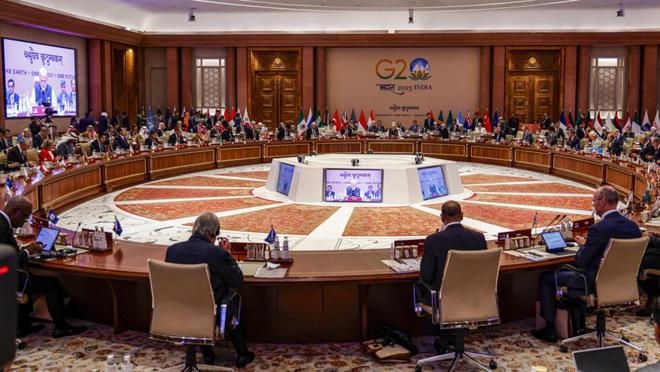
9月9日开幕的G20峰会(图源:AFP)
正如我所说的那样,我们今天在人口方面占多数,就全球国内生产总值而言,一些增长最快的经济体都在全球南方,印度和中国正在以每年5%到6%的速度增长,一些非洲国家也在加速增长。美国的增长率约为1.6%,大多数欧洲国家的增长率低于1%,有些国家甚至出现了负增长。因此,我们是全球经济增长的引擎,所以金砖国家表示,我们将是塑造新的全球架构的先锋。我们将与各方合作,包括北方和南方国家,实现共同愿景,创造一个更加公平的世界。
观察者网:您是印度裔南非人,尽管南非有超过一百万的印度裔南非人,但这个群体经常遭到忽视。许多人认为印度裔南非人“处境尴尬”,而一些政治领导人称南非的政治主要由黑人控制,而经济则主要由少数白人控制。南非如何才能充分发挥其作为“彩虹之国”的潜力?
苏克拉尔:在种族隔离时期,所有非白人都被归类为黑人,包括我和所谓的印度裔南非人。我们作为非洲人参加了解放斗争,因为我首先是南非人,我是第三代南非人,不是印度人,南非的政府也将我视为南非人。
我们拥有丰富的种族、文化、民族和语言多样性,共有11种官方语言,各社群都有平等的发言权,并通过我们国家的宪法得到平等的尊重。我认为这是南非的魅力和优势所在,也是曼德拉总统将南非描述为“彩虹之国”的原因,因为我们是整个非洲最国际化、人口最多样化的国家。
我认为这也是我们在种族隔离后开展民族和解的原因。种族隔离制度下存在的默认界限是基于种族来确定南非人的身份,这违背了南非民主所代表的根本结构,也违背了我们宪法所描述的,即每个公民都是南非平等的一部分,我们都是南非人。
观察者网:南非的经历似乎非常适合推动全球南方的议程。
苏克拉尔:的确如此。南非是一个摆脱了殖民主义、种族隔离和帝国主义的国家。我们和全球南方的许多国家面临着同样的困难,理解其中的痛苦。因此,我们必须在全球舞台上捍卫正义、公平、平等和平等代表权。
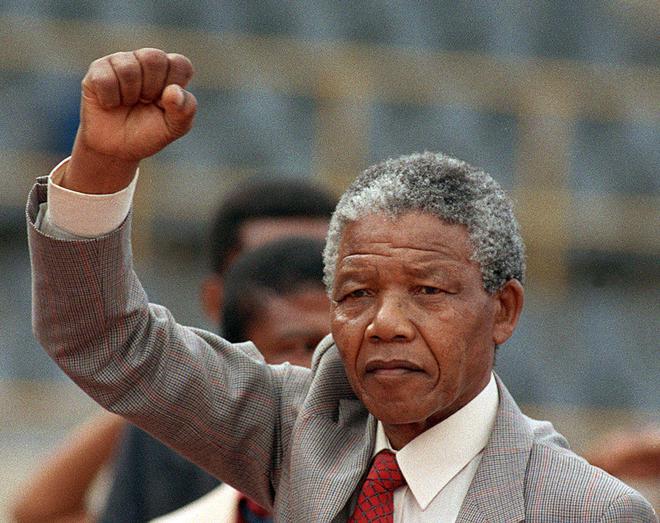
曼德拉
我总是把当前的地缘政治结构比作种族隔离期间的南非,当时少数人决定着多数人的命运。今天的全球南方就是这样。我们是多数,但不到十亿人的少数却在决定我们应如何运作,决定什么符合我们的利益。
我们宣布,全球南方已经崛起。今天,中国是全球第二大经济体,据预测在十年左右的时间里可能会成为全球最大的经济体;印度是全球第五大经济体,在十年左右的时间里,它将成为全球第三大经济体;巴西是全球GDP排名前十的主要经济体。因此,全球南方已经发生了翻天覆地的变化,就经济、生活水平、技术、新科技、创新、领导力而言,全球南方的许多国家都超过了G7集团。因此,全球南方再也不是“穷乡僻壤”了。这也是金砖存在的原因,倡导变革,不将任何群体边缘化。
无论是全球北方还是南方,我们都需要共存和合作。这就是为什么习近平主席谈到人类命运共同体。这正是金砖的原则,一个共同的命运,所有人都能平等参与塑造的未来,决定我们如何和平、和谐地毗邻共处,为共同富裕而一同努力的未来。
以下为英文原文:
Guancha: One of the most widely reported results of the BRICS summit was its expansion, with six new members joining. What do you think these new members bring to the table?
Sooklal: Well, firstly, BRICS expansion was one of the key outcomes of the 15 BRICS summits in Johannesburg, as you recall that last year at the virtual summit held under China's chairship, there was a decision by leaders to look into a question of expansion. And of course, it was expected that this summit would respond to the leader's call to the issue of expansion, and the leaders did take a decision in this regard. Now, of course, in order for us to have considered expansion, we had to first finalize the mandate given to Sherpas by the leaders at last year's summit, where they tasked help us to work out guiding principles, standard criteria and procedure for expansion. So this document was adopted by consensus and referred to the foreign ministers who then could look into the question of which countries, as you know, there were 22 countries that formally approach BRICS member states to become members. Now, the leaders applied themselves to this and had an in depth discussion that lasted several hours at the BRICS Retreat on the evening of 20th of August in Johannesburg.
I think it's important to note that of the six countries, there is an important geographical spread. We have an additional country from Latin America and the form of Argentina. We have two African countries, Egypt. As far as Africa is concerned, it is an Arab country but it's an African country in the first instance, as a member of the African Union. And of course Ethiopia. Then we have three countries from West Asia, Saudi Arabia, UAE and Iran. I think this is a good balance given that we have a country from South Asia and the form of India and China from Northeast Asia. So you have an excellent spread, geographical spread from nearly all of the regions of the world pertaining to the developing world. So I think this is an important addition in terms of geographical balance to the BRICS family.
Now if you look at the collective weight of these countries collectively, we will now account for 46% of the global population as against the 42% that we were, we will account for 29% of global nominal GDP. With the entry of Argentina, we have two of the regional leader in Latin America. Ethiopia is an important country in terms of being the only African country that was not colonized. Secondly, it is a seat of the African Union. But in its own right, Ethiopia is an ancient culture, ancient civilization. So it brings all of that into the BRICS family.
Now if you look at Western Asia, all three countries are important. Saudi Arabia, Iran, very important countries in the region. They are the regional leaders, the largest nations, Saudi Arabia, about 38 million, and Iran over 80 million people. Likewise, the UAE, maybe a small country, but it is a very pivotal country in Western Asia. In fact, it is a one of the remarkable countries that have progressed from being just a mere fishing village in the 70s, today becoming one of the most dynamic countries. It has the second largest GDP among Gulf countries, second to Saudi Arabia, and one of the most cosmopolitan countries in the region.
Each of these countries bring in an additional dimension in enriching BRICS, not just in terms of trade, in terms of GDP, in terms of technologies, in terms of the peoples, the diversity of the cultures, the civilizations and the richness they bring into the BRICS family. So from a multi-dimensional point of view you have greater diversity, greater weightage and of course all three West Asian countries are very rich in terms of fossil fuels, especially oil and gas. And in addition to Egypt as well and Russia and Brazil, BRICS will account for over 40% of global fossil fuel reserves. And this is also highly significant.
Guancha: On the Middle East in particular, do you view this just in terms of regional diversification and their greater economic weight, or is there another dimension to the focus on the Middle East of this year's expansion. Over the past few months, there's been a lot of discussion about reduced US influence in the region, especially after China brokered the Saudi Arabia and Iran rapprochement.
Sooklal: I think Western Asia has always been a very important strategic region in the world, given its geopolitical location in terms of its rich deposits of oil and gas. That is why you have had a deep focus on this region, especially from Western countries. But these countries also want to diversify and have stronger relations with the Global South. And I think the intervention of China earlier this year in bringing rapprochement between Saudi Arabia and Iran was a major development in the region. And that rapprochement has had a ripple effect in terms of normalizing relations between countries of the region, we have seen normalization of relations amongst the Gulf countries with the Iran. Just this week, Iran and Saudi Arabia exchange ambassadors. And I think that's a very positive development, not just for the two countries, but for the region as a whole. And I think also for the global geopolitical and geo-security situation, this is a positive development where you can have peace in a region that has been the fraught with major difficulties. We've always maintained that Iran and Saudi Arabia hold the key to peace in the region. And as long as they were not speaking to each other and there were tensions between them, the region as a whole suffered.
So you can see that with their rapprochement, countries are now starting to exchange high level delegations, embassies are being opened, normalization of relations and there's greater opportunity for peace and development in the region. So I think this has been a very positive development. Now, having both of them as part of the BRICS family is also a positive development because it will give them a further opportunity, a further platform to interact with each other on a regular basis being part of the BRICS family. So I think it was indeed a very positive development for the BRICS leaders to invite both these countries together with the UAE, recognizing the strategic significance of this region and also remember all three of these countries applied to become BRICS members. So they saw the value in associating with BRICS and they see that their future is tied with the future development of BRICS and they can contribute significantly to the future development of breaks.
Guancha: How do you think the introduction of new members into BRICS will be continued in the coming years? Some media reports had claimed that India or Brazil wanted to set stricter standards on the admission of new members, while China and Russia were more unequivocally supportive of admitting new members. What have you heard, and how this dynamic affected the statement they released?
Sooklal: I have been integrally involved in this process from its outset and being chair of the Sherpas Group. There is no truth to the fact that India and Brazil were opposed to expansion. I think this is misinformation. And I want to correct that. All of the BRICS countries had agreed on expansion. Where there were differences of opinion initially was the criteria that we need to develop. And this was an intense process.
As you know, the process started on the China's chairship last year. There were two meetings then, but very little progress was made. But when South Africa took over the Chirship this year, we had at least six meetings at the level of Sherpa to Sherpa, was a very intense process. All countries were committed to expansion because that was the decision of all of the five leaders last year to start the expansion process. So there were no country opposed to expansion.
In any multilateral organization like BRICS, all countries would want to ensure that their positions are reflected. And eventually, through consensus, we were able to confirm the document that pertains to criteria and standards and so forth. And this made possible the movement in regard to progress on expansion so that our foreign ministers could look at what we had set down as criteria and apply themselves and make recommendations to our leaders. And I think the fact that we had consensus from all of the leaders on the six countries, this is a substantial expansion of BRICS. As you know, the last time BRICS was expanded was in 2011 under China's chairship at the sunny summit when South Africa was admitted as a full member. So for the past 12 years, we have not expanded. We did try to look at expansion in 2018 on the South Africa's chairship. We put that as an agenda item, but leaders felt at that stage we needed to consolidate further the cooperation between, between the five of us before we embark on expansion. So expansion was put again on the table under China's chairship, and we worked as a collective. And I believe there was a very positive outcome in terms of us being able to announce the new members. And expansion is an ongoing process.
And as President Ramaphosa announced at the summit, this is the first phase of expansion. He didn't say that expansion is closed. And if you look at Article 92 of the Johannesburg 2 Declaration, the leaders have tasked foreign ministers to look at the issue of developing, modalities for partner countries and to report to the summit next year when the leaders meet in Russia for the 16 BRICS summit. So I think you were continuing seeing countries wanting to become full members and I'm sure that expansion will be considered again going forward, the leaders will have to apply themselves to this because there's a high level of interest from countries from the Global South that would want, to become part of this family.
Guancha: Briefly, what is the consensus on admission criteria that were agreed upon, and also what country are you prioritizing out of the 16 that weren't admitted? Also, why expand now, after over a decade?
Sooklal: The documents that outlines the criteria, standards and guidelines, is internal and confidential, that will now be shared firstly with the six countries. As you know, there was a formal invitation that was made verbally at the summit, but President Ramaphosa is in the process of writing to each of the six heads of state, formally inviting them to become full members and attaching the document criteria which they will have to subscribe to.
Now I can very broadly say that in choosing the six members, we were careful to make sure that they also subscribe to the vision and principles that BRICS stand for: creating a more equitable world, supporting reform of the global governance architecture, political security, financial, economic, the commitment to upholding multilateralism, rejecting unilateralism and of course commitment to a to upholding international law. And of course these are some of the very key tenants that BRICS have subscribed to since its inception. So it's important that the new members also fit into this ethos that governs and guides BRICS cooperation. So these were key principles and of course these countries fully understand that what BRICS stands for, and therefore they apply to become BRICS members. I don't think they'll have difficulty in supporting the values and principles to which BRICS subscribe to and to which they are also keen advocates, often creating a more inclusive world in addressing some of the major fault lines that still exist in the current global governance architecture.
And of course, as I've indicated, they had to be of good standing in the respective regions, countries that playing an important role in their respective region, and of course internationally through the global multilateral system. And as I've also indicated, we also try to look at geographical representation so that BRICS has a good representation from across the region of the Global South. And of course, another very important criteria is that you had to be by a member of the Global South, because BRICS is about developing countries. So these are some of the key principles contained in the document pertaining to the Guiding Principles and criteria.
Between now and the next summer, there'll be no more expansion. We will await the outcome of the minister's consultation in terms of developing modalities for partner countries. Because when we met as Sherpas, we had proposed a modality that first looked at countries becoming full members, like the six now that have been invited, will become full members with equal standing as the existing five members of BRICS. But at the same time, we propose that we should also have a modality looking at partner countries that are very keen to have an association with BRICS, but may not want to be full members. And we have instances of that, where countries have stated that they would like to be associated with BRICS, but have not applied for full membership. So that's the process that our ministers will be busy with over the next year, and come up with recommendations to the leaders at the summit in Russia next year.
Guancha: How would the addition of new members affect the acronym BRICS?
Sooklal: I don't think the acronym will be altered or affected because when you speak of BRICS today, BRICS has become a global brand in a sense. BRICS now signifies certain values and principles that has been championed by BRICS, but not just exclusive to BRICS. The fact that we had at the BRICS Plus and the Africa Outreach, 61 countries in attendance, they all identify with what BRICS stand for.
So BRICS today is not just about five countries. When you use the term BRICS, it's not specifically about these five countries. It's grown beyond that. It's grown, as I've said, into a brand that represents the aspirations of the Global South and what we would like to see in changing the current global architecture, to be more multipolar, to be multi civilizational and multicultural in terms of being representative of the nature of the global community. The global community is not homogeneous. It's highly heterogeneous. And that's the nature of BRICS.
Very often BRICS is criticized in terms of being so heterogeneous, so different in terms of our systems of governance, in terms of our political systems, in terms of our peoples, our cultures and so forth. But this is the richness of BRICS. This is why BRICS function so well. We don't seat to straight jacket everyone into a uniform code of behavior or how they should conduct the internal domestic affairs. We respect the sovereignty. We respect the systems of governance and the political systems of every country. And we value the richness of the traditions of each country, its people's, its culture, its civilization, its cuisine, its modes of dress, its languages. This is the richness of BRICS. And that's the nature of the world. The world is rich because we have such diversity in it. The world is not a uniform society, so why should BRICS be criticized by not having a uniform system of governance between all of us? The strength of BRICS is each one of us bring to the table that diversity and the richness of our traditions and of our systems of governance.
Guancha: Regarding the issue of differences, there has been some concern that these differences might cause issues going forward especially in terms of internal functioning, because some countries within it have somewhat divergent interests, like India and China, and Irana and Saudi Arabia; at the same time, political changes in other countries, like Brazil, and potentially Argentina, where a far-right advocate of “full dollarization” may be elected, leading to fluctuations in their level of engagement. Do you think these concerns are misplaced, and how might BRICS deal with these issues?
Sooklal: BRICS is not a platform for countries to come and settle their differences. It's to provide the platform where they can come and discuss the differences and see if they can find ways and means of addressing these. BRICS is a consensus based organization.
Yes, there are differences between countries. There are tensions between countries. This is normal. It's not unique to the BRICS family. You find this in a large number of multilateral or and regional organizations. The European Union have its own challenges in terms of differences with regard to the Russia Ukraine conflict, for example, and the way some of the Eastern European countries relate to it as against Western European countries. The same with ASEAN in terms of the challenges around Myanmar, you have divergent opinions amongst ASEAN members on this. Likewise, you find this in all regional and multilateral organizations. But it provides a platform where these countries can come and talk to each other. And I think that is important, having a platform where countries may have differences, but they are still able to dialogue on the larger picture and concentrate on what is good for the global community. And bracket for a moment the differences they may have, but look at what as a collective, as important countries of their respective region, as important global powers, how they can work collectively for the good of creating a more equitable global order. And that is what BRICS is about.
The tensions that are there between India and, and China that will be addressed bilaterally. The tensions between Iran and Saudi will be addressed bilaterally. But that doesn't prevent these countries from cooperating on other major global issues, like reform of the global multilateral system, like addressing issues of climate change, like addressing the current challenges we face in terms of the pandemic, the challenges we face in terms of food security, in terms of energy security. And these are key challenges that impacts on all of us. And this is the areas where we apply our minds as a collective and work collectively to address this in a positive manner.
Guancha: You mentioned the European Union, which probably represents the upper limit of how different countries can cooperate. And you see some issues, especially with regard to the Russia Ukraine war, as you just mentioned, where differences of opinion led to them, for example, failing to implement several sanctions packages to considerable international embarrassment. So does this mean that there's a limit to how effective BRICS can be, that while it can be effective in terms of fostering dialogue, it might be less effective in achieving tangible results in other fields?
Sooklal: Well, I think if you look at the areas of cooperation, firstly, within BRICS, we have 20 ministerial tracks and this is increasing. We, as I've said, we, by the time we complete our chairship, we would have hosted close to 200 meetings. Now, the measure of success of our cooperation is not in terms of the number of meetings we host, but the substantive outcome of these meetings. If you look at all of these major tracks, there are substantive outcomes. If you look at science, technology and innovation track, there is over 200 joint research projects that is currently undertaken by our scientists, by our academics and also students. There’s substantive cooperation for the benefit of the BRICS countries.
So I think that's the value that BRICS brings. The success of BRICS must be measured on the practical value it brings to the lives of our people. It must be able to address issues of poverty and underdevelopment. It must address issues of food insecurity, debt relief. These are all issues that have been spoken about by our leaders.
There was a big issue in terms of local currency. And that's why if you look at Article 45 of the declaration, the leaders task finance measures or central bank governors to look at the issue of local currency payment instruments and platform, and to report at the next summit because we are looking at diverse ways of how we conduct our business, our trade and our financial interaction on the global stage and not being dependent on one or two currencies to our disadvantage.
Now, these are major issues and BRICS has been a catalyst. China has created its own payment platform. India has done the same. Russia has done the same because all of the countries of the global south are very anxious because of unilateral sanctions, where funds are frozen. They don't have access to their money as is the case with Russia and Iran. And we are looking at becoming more independent and not being held hostage by one or two countries that apply unilateral sanctions, not recognized by any of the BRICS countries, sanctions not recognized by the United Nations as being the only body that has the task of looking at international sanctions, The Security Council. Therefore, BRICS are able to do practical things. And today the use of local currencies has gone beyond BRICS.
A large number of countries, Africa included, are looking at deepening trade in local currency, borrowing in local currency. The New Development Bank, as you know, has taken a decision that it will increase lending from its current 20% to 30% by 2026 in local currency. They floated the second bond in local currency amongst member states, having floated several bonds on the Chinese Yuan market. They've done so now last month on the South African Rand market. And that bond was oversubscribed. That set a ceiling of 1 billion Rand, but they increase it to 1.5 billion because of the intake by people buying these bonds. And they can see that these are bonds that would grow positively given the track record of the New Development Bank. And this is good news for South Africa because we can start borrowing in Rand terms and save a lot of funds in terms of dollar fluctuation and conversion cost and so forth. And the African Union has taken a decision that in order to facilitate the free trade agreement, countries should deepen trade in local currency and that's why the African Bank has floated the Pan African payment and settlement system. About 10 central banks and over 20 commercial banks have subscribed to this instrument, which is expected to save Africa over $5 billion annually in terms of trade costs. So you can see that BRICS is a catalyst for change on the global front on a number of areas. And this is just one example I'm sharing with you. The repercussions in terms of deepening trade in local currencies and not being dependent on the dollar, the only and including our payment systems that we are not just dependent on the SWIFT system. As I've said, all of the major BRICS countries are now creating their own payment platforms.
Guancha: In the recent interview with Bloomberg, you said that “there’s an unfortunate narrative being developed that BRICS is anti-West, that BRICS was created as competition to the G7 or the Global North, and that is incorrect”. Do you think that your view is shared by all BRICS members? For example, Iran said that it joining BRICS signifies growing opposition to US unilateralism. And Russia has also up made some references to BRICS as a platform for an anti-US agenda.
Sooklal: All 5 of us are unanimous that BRICS is not an anti-West organization. BRICS is an entity that focuses on ourselves, firstly, and secondly on the Global South. And thirdly, in terms of collectively addressing the global challenges and working in partnership with all those that seek to work with us, that share our values, that share our vision in terms of what we would like to see in addressing the global challenges. And that is why you had the Secretary General Antonio Guterres also addressing the BRICS Summit. And he stated that the Global North must do more to address the frustrations of the Global South, the Global South that forms 85% plus of the global population are still being marginalized, are still outliers in terms of major global decision making.
For BRICS, we're five partners and with the addition of the six, there are two additional G20 members. So we would be seven G20 members in the G20; just as you have G7 as seven G20 members. So between G7 and BRICS, we would be fourteen of the 19 countries that make up the G20, the EU being the 20th and hopefully after the summer this weekend in India, the African Union will become a full BRICS member. And I think that's also would be a major boost for the Global South. Because in this day and age, why just the European Union as a full member of the G20? The African Union is bigger, 55 countries, 1.4 billion as against less than 600 million people in the European Union and 27 countries. But because it's a develop western country, you're then given prime place in the G20 and not Africa. And that's why we're saying that BRICS is about championing the cause of Africa. And it is BRICS countries that are pushing for the African Union to become a full member.
We've started this process. South Africa has been calling for this and BRICS countries have been supporting this. Fortunately now the countries of the Global North also supporting this. So we will work with the Global North who share our vision and values to create a more equitable world and not to continue as hegemons dominating the global agenda and determining how the rest of the world should function and what is in our best interest.
We are today collectively as I've said population-wise the majority, and in terms of global GDP, some of your fastest growing economies are still on the Global South. India and China are growing at 5 to 6 percent, several of the African countries are growing at an accelerated pace. The USA is growing at about 1.6%. Most of the European countries are growing under 1%, some even into negative growth. So we are the engine of growth and therefore BRICS is saying we will be at the forefront in shaping the new global architecture. And we will work with all parties, the north and the south, but those that share our vision and aspire to create a more equitable.
Guancha: You are an Indian-South African, a group that is frequently overlooked by international observers of South Africa, despite numbering over one million. Many have described your community as fitting "awkwardly” into modern day South Africa, where a number of political leaders have described politics as being controlled mostly by blacks and the economy controlled by a mostly white minority. Is this somewhat similar to the Chinese community there? How can South Africa fully live up to its potential as the “rainbow nation”?
Sooklal: During apartheid, all those that were not white were categorized as blacks, including myself and so called Indian South Africans. We were all regarded as blacks. We fought in the liberation struggle as Africans. Because I'm first and foremost a South African. I'm third generation South African. I'm not Indian. I'm South African. My identity is South African. I'm born and raised in South Africa. And I do not see myself anything else but a South African national. That's how I'm categorize even in my official documents. My government sees me as a South African. I mean, when I function as the Sherpa of South Africa, I'm not seen as an Indian South African. I'm seen as a South African like any other person that I work with.
And that's the beauty of South Africa. We have this rich diversity of races, of cultures and of peoples and languages. That's why we have 11 official languages and all of the various communities have an equal say and are equally respected through the Constitution of our country. And I think that's the strength of South Africa and that's why President Mandela describes South Africa as a rainbow nation, because we are the most cosmopolitan, most diverse population in the whole of Africa. That's the strength of South Africa.
And I believe that is why we have a program post-apartheid period of national reconciliation. The default lines that existed under the apartheid regime were based on identifying South Africans on the basis of race. This was against the very fabric of what South Africa's democracy stands for and what our constitution describes, where each and every citizen is equally part of South Africa and we are all South Africa.
Guancha: Certainly this makes South Africa seemingly well placed to promote the agenda of the Global South.
Sooklal: It is. South Africa is a country that has come out of colonialism, of apartheid, of imperialism. We have faced all of these difficulties like many of the countries of the Global South. And we understand the pain and discomfort. So therefore, having come from this background, it is important for us to champion for justice, for fairness and for equality and equal representation on the global stage.
I always compare current geopolitical architecture to Apartheid South Africa, where you had a minority determining the fate of majority. And that's what the Global South today is. We are the majority, but a minority, less than a billion people, determines how we function and what is in our best interest. And we are saying that the Global South has risen. Today, China is the second largest global economy and it's predicted within a decade or so, it may become the largest global economy. India is the first largest global economy today, and within a decade or so, it will become the third largest or so. Brazil is a major economy in the top ten of global GDP. So the Global South has changed. Many countries of the Global South are bigger than the G7 today in terms of the economies, in terms of the GDP, in terms of the standard of living, in terms of technology, new science, technology, innovation, leaders in terms of this. So you can't speak of the Global South as being poor and marginalized anymore. And that is why BRICS is there, to champion change for the better, not relegating any community to the margins.
Both north and south, we need to coexist and work together. And that's why President Xi speaks of a community of shared future for mankind. It's precisely the same principle that we have, a shared future, a future where all of us must have equal stake in determining how this future is shaped and how we live side by side in peace and harmony, working collectively for prosperity for all.
本文系观察者网独家稿件,文章内容纯属作者个人观点,不代表平台观点,未经授权,不得转载,否则将追究法律责任。关注观察者网微信guanchacn,每日阅读趣味文章。





